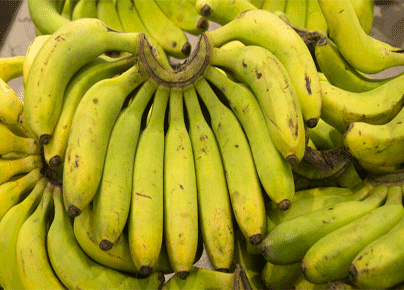FWI: New Varieties of Bananas to Sustain the Sector
2022-12-16

They are called 964, 965 or 966: the Tropical Technical Institute (IT2) has developed new varieties of bananas intended to be more resistant to natural hazards to sustainably strengthen the sector in Guadeloupe, which has been undermined by numerous diseases.
"It is for us to perpetuate the sector", explains to AFP Jean-Louis Butel, whose exploitation found in Saint-Sauveur (Guadeloupe) welcomes a few hundred feet of these new varieties.
Cavendish, the queen variety on the world market, is threatened by black Sigatoka, a leaf disease that affects the quality of bunches, and so-called "race 4" Fusarium wilt, not yet present in the territory.
"We know it's a matter of time," said Marcus Hery, director of IT2.
The goal? Create a variety that will resist and make it possible to keep the activity of the sector, which weighs "96.2% of exports by volume of the Guadeloupean primary sector", according to the 2021 annual report of the Overseas Emission Institute (Iedom).
After their "natural hybridization" at the Center for International Cooperation in Agronomic Research for Development (CIRAD), "we make them pass tests by inoculating them with diseases", specifies Mr. Hery.
It is only afterwards that a first phase of tests "in situ" is carried out among producers, before the variety is generalized.
“We know that the future is in organic production, so our varieties are grown in a state close to that of nature, underlines Jean-Louis Butel.
The producer recognizes the difficulty of competition with the Dominican Republic, which sets the reference price for organic bananas, "because labor is cheaper and especially where phytosanitary standards are less drastic".
He and the director of IT2 remember the debacle of the 925 or "Pointe d'or" variety. "We had done enormous work on this banana, created about twenty years ago" and which had been "transferred to producers in the mid-2010s", says Marcus Hery.
In 2019, this one ticked all the boxes: "not too tall", to remain easily cultivable and not have too much wind resistance if a cyclone, and "disease resistant", even if it darkened more easily after the harvest.
The pre-marketing agreement was concluded with Biocoop before the company retracted.
Even after the sector found a new outlet, at Carrefour Bio in 2020, this variety, "cerco resistant" did not tolerate export: the bananas arrived too ripe and blackened and therefore impossible to market.
Result? The producers had to rip it all out. "A loss of around 1,200 tonnes of bananas, not compensated except by a solidarity fund from the group", sighs the farmer.
Finally, the specter of chlordecone, a highly toxic pesticide spread in banana plantations until the 1990s, continues to haunt public, health and agricultural spaces in the West Indies, even though it is recognized as the cause of high rates of cancer in the prostate in Martinique and Guadeloupe.
Jean-Louis Butel, who looks with interest at the practices of biodynamic viticulture, without synthetic products.
However, he is aware that the West Indian banana stays a niche product at the global level, unless a revolutionary variety changes the situation. The future may involve economies of scale, by pooling the packaging of diets for example, or by betting on agro-processing.
And this, even if the banana of the Antilles, in lack of profitability, is largely subsidized.
The sector is "recipient of a significant share of public support for overseas agriculture, around 23%, or 128 million euros which are paid to Martinican and Guadeloupe producers", according to the Economic Affairs Committee of the Assembly. .
Amid these questions, the banana can however count on the additional degrees promised by climate change which could well, according to specialists, create better conditions for its cultivation, all varieties combined









